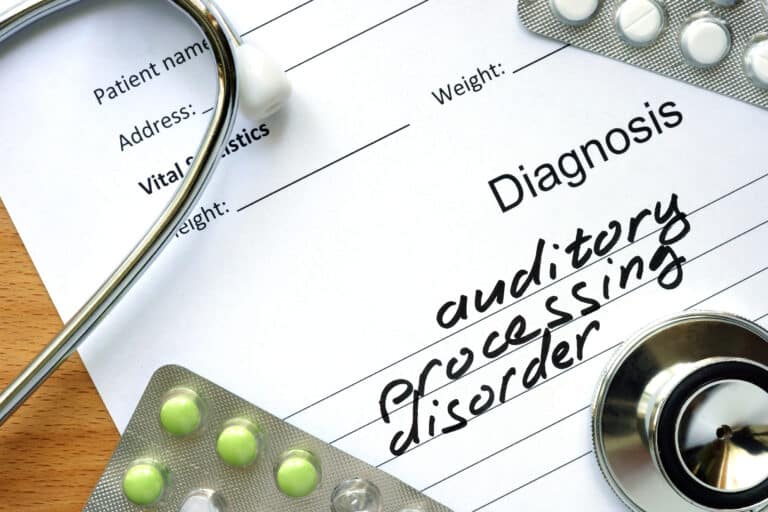
Frequent distortion of speech is the reality that many people with auditory processing disorder (APD) face on a daily basis.
In this blog on APD, we’ll look at the following topics:
- What is auditory processing disorder?
- How does auditory processing disorder affect learning?
- Is auditory processing disorder a disability or neurodivergent?
- Does auditory processing disorder coexist with other conditions?
- What is the best therapy for auditory processing disorder?
- Can you get an IEP for auditory processing disorder?
What is Auditory Processing Disorder?

APD is a hearing-related disorder that affects 3-5% of children under 12. It’s not a hearing loss disorder but a disruption of understanding. Children and adults with APD face difficulties in understanding sounds and spoken words, as communication between the brain and ears is hindered. With background noise and other reverberations, it becomes challenging to distinguish aspects of speech.
Symptoms of auditory processing disorder include:
- Difficulty understanding speech or processing sounds
- Difficulty reading, spelling, or writing
- Decreased attention span in auditory settings
- Easily distracted by loud or sudden noises
While central auditory processing disorder is presumed to be hereditary, APD can also be triggered by external factors, including:
- Chronic ear infections
- Head trauma
- Lead poisoning
- Seizure disorders
The official cause of APD has yet to be identified, but all of the above-listed factors are suspected sources.
APD can create difficulty outside of hearing. One may also need help with general language comprehension. Side effects such as “auditory discrimination” can make distinguishing between syllables and similar sounds hard.
APD can impose on one’s auditory memory, curating difficulty in recollection—these both impact general language comprehension, which is needed for all aspects of reading and writing.
How Does Auditory Processing Disorder Affect Learning?

People diagnosed with APD may struggle with expressing themselves clearly in verbal or written form because they don’t correctly process what they hear. Because of this, APD may cause other related language disorders. As APD heavily affects the learning process, people with APD may struggle in specific reading and writing tasks and understanding general information and instructions.
Is Auditory Processing Disorder a Disability or Neurodivergent?
Under IDEA (Individuals with Disabilities Education Act), APD is classified as a “specific learning disability.” This disorder affects the brain’s ability to process language and sensory information, so it’s also considered a neurodivergent condition. APD may create learning differences and distinct academic strengths, but it doesn’t have to define one’s ability to succeed.
Does Auditory Processing Disorder Coexist with Other Conditions?
APD can cause learning delays and may be linked to dyslexia and ADHD. Those with ADP can exhibit a wide range of mild and severe symptoms and can be compared to other neurological disorders, including ADHD, depression, and speech/language delays.
APD can often be misdiagnosed for other learning disabilities because of their similar symptoms. In addition, it’s estimated that approximately 50% of people diagnosed with ADHD also receive an APD diagnosis. It changes how someone processes and understands information, so it typically becomes linked to other conditions.
What is The Best Therapy for Auditory Processing Disorder?

APD can be diagnosed through listening tests in a sound-structured room, allowing the audiologist to understand the person’s direct obstacles. It’s important to get tested for APD as soon as possible so that a person can prevent listening and learning difficulties in all areas. Customizing their environment will make a remarkable difference in a person’s APD experience.
APD cannot be cured but can be aided by a multitude of approaches. Alongside the help of audiologists and speech-language pathologists, a person with APD can find what methods work best for them. Successful techniques and therapies include:
- Assistive listening devices (where sound can be reduced or heightened)
- Speech-language therapy
- Occupational therapy
- Music therapy
- Art therapy
- Auditory training (exercising auditory processing skills in a controlled environment)
- Classroom support
These strategies allow both adults and children with APD to develop better language and listening skills, comprehension, and self-esteem. Other methods can be practiced at home, such as quieting the environment. All of these elements will help one manage their symptoms better.
Can You Get an IEP for Auditory Processing Disorder?
Because APD is considered a learning disability, a person with APD qualifies for services and accommodations under an IEP. This includes custom assignments that focus on the following:
- Fewer steps
- Increased testing time
- Minimized emphasis on correct spelling
- A quiet academic environment






